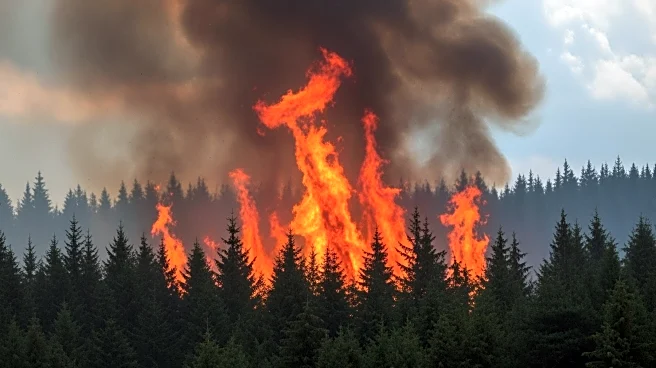What's Happening?
The World Meteorological Organisation (WMO) has reported a record increase in atmospheric carbon dioxide levels, rising by 3.5 parts per million (ppm) between 2023 and 2024. This surge marks the largest
annual increase since modern measurements began in 1957. The increase is attributed to ongoing emissions from human activities and a significant contribution from wildfire emissions. Additionally, the Earth's natural carbon sinks, such as oceans and land ecosystems, have absorbed less CO2 due to rising global temperatures and a strong El Nino weather pattern. The WMO highlights that the heat trapped by CO2 and other greenhouse gases is intensifying climate change, leading to more extreme weather conditions.
Why It's Important?
The record increase in CO2 levels is a significant concern for global climate stability. As the Earth's natural carbon sinks become less effective, more CO2 remains in the atmosphere, accelerating global warming. This poses a threat to economic security and community well-being, as extreme weather events become more frequent and severe. The WMO emphasizes the need for reducing emissions to mitigate these impacts. The situation underscores the urgency of protecting natural systems, which play a crucial role in absorbing emissions and combating climate change. Failure to address these issues could lead to long-term environmental and economic consequences.
What's Next?
The WMO calls for sustained and strengthened greenhouse gas monitoring to better understand the dynamics of carbon sinks and emissions. There is a pressing need for global efforts to cut climate emissions and protect natural ecosystems. Organizations like WWF stress the importance of urgent action to preserve the planet's land and oceans, which are vital allies in tackling climate change. As the world faces its hottest year on record, international cooperation and policy changes are essential to address the challenges posed by rising CO2 levels and their impact on climate patterns.
Beyond the Headlines
The weakening of natural carbon sinks raises ethical and environmental concerns about humanity's impact on the planet. As these systems struggle to keep up with emissions, there is a risk of entering a vicious cycle where reduced absorption leads to further warming. This highlights the need for a holistic approach to climate policy, integrating conservation efforts with emission reduction strategies. The long-term implications of failing to act could include irreversible damage to ecosystems and biodiversity, affecting future generations.









